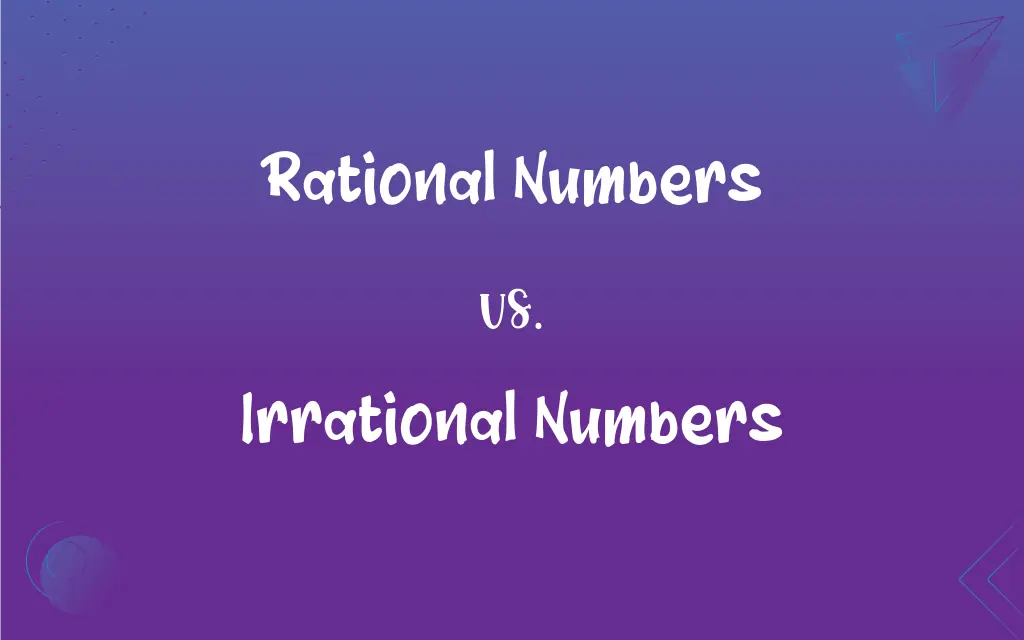Rational Numbers vs. Irrational Numbers: What's the Difference?
Edited by Aimie Carlson || By Harlon Moss || Updated on June 9, 2024
Rational numbers are numbers that can be expressed as a fraction of two integers, while irrational numbers cannot be written as such a fraction.

Key Differences
In mathematics, numbers are classified into various types to understand their properties and characteristics better. Rational numbers and irrational numbers represent two distinct categories within the realm of real numbers. Rational numbers can always be expressed as a fraction of two integers, meaning they have a numerator and a denominator where the denominator isn't zero. On the contrary, irrational numbers are those numbers which cannot be written as a simple fraction or ratio of two integers. Their decimal representation goes on forever without repeating. For instance, while the number 0.5 is rational because it can be represented as 1/2, the number π (pi) is irrational because it cannot be exactly expressed as a fraction.
Another way to distinguish between rational numbers and irrational numbers is by looking at their decimal expansions. A rational number will always have a decimal expansion that either terminates (like 0.25) or eventually repeats (like 1/3 = 0.333...). In contrast, the decimal expansion of an irrational number neither terminates nor repeats.
The existence of irrational numbers was a significant realization in ancient mathematics. Pythagoras's followers initially believed that all numbers were rational until they discovered the irrationality of the square root of 2. This discovery challenged their foundational beliefs about numbers and ratios.
Both rational numbers and irrational numbers are vital for various mathematical and real-world applications. While rational numbers are more intuitive and frequently used in everyday calculations, irrational numbers, like π and e, play crucial roles in advanced mathematics and sciences.
Comparison Chart
Definition
Can be expressed as a fraction
Cannot be expressed as a simple fraction
ADVERTISEMENT
Decimal Expansion
Terminates or eventually repeats
Neither terminates nor repeats
Examples
1/2, -3, 0.75
π, √2, e
Presence in Real Number Line
Everywhere on the number line
Fill the gaps between rational numbers
Historical Discovery
Always known and used
Challenged ancient beliefs about numbers
Rational Numbers and Irrational Numbers Definitions
Rational Numbers
Numbers that can be placed exactly on the number line using fractions.
Every point on the number line corresponds to a rational number or an irrational number.
ADVERTISEMENT
Irrational Numbers
Mathematical constants and root values often not expressible as fractions.
The golden ratio, often denoted by φ, is another example of an irrational number.
Rational Numbers
Numbers with decimal expansions that terminate or eventually repeat.
0.33... is a rational number because its decimal expansion repeats.
Irrational Numbers
Numbers that fill the gaps on the number line between rational numbers.
Between any two rational numbers, there are infinitely many irrational numbers.
Rational Numbers
Numbers that can be written as p/q where p and q are integers and q ≠ 0.
7 is a rational number because it can be expressed as 7/1.
Irrational Numbers
Numbers with non-repeating and non-terminating decimal expansions.
√2 is an irrational number because its decimal representation goes on forever without repeating.
Rational Numbers
Numbers that can be expressed as a ratio of two integers.
5/2 and -4 are both examples of rational numbers.
Irrational Numbers
Numbers that cannot be written as a simple fraction.
The number π is an irrational number as it can't be expressed as a fraction.
Rational Numbers
The set of numbers that includes integers, finite decimals, and repeating decimals.
The number 0.125 is a rational number because it is a finite decimal.
Irrational Numbers
Numbers that cannot be expressed as the ratio of two integers.
The number e, the base of natural logarithms, is irrational.
FAQs
Are all fractions rational numbers?
Yes, all fractions with non-zero denominators are rational numbers.
Can irrational numbers be approximated by rational numbers?
Yes, irrational numbers can be closely approximated by rational numbers.
Do rational and irrational numbers together form the set of real numbers?
Yes, the set of real numbers consists of both rational and irrational numbers.
Are percentages rational numbers?
Yes, percentages can be expressed as fractions and hence are rational.
Is the number π (pi) rational or irrational?
π (pi) is an irrational number.
Can the square root of a prime number be rational?
No, the square root of a prime number is always irrational.
Is zero a rational number?
Yes, zero is a rational number because it can be expressed as 0/1.
Can a number be both rational and irrational?
No, a number cannot be both rational and irrational at the same time.
Do irrational numbers have exact values?
Yes, though they can't be expressed as fractions, they have exact values, like √2 or π.
Are there any operations that can turn rational numbers into irrational ones?
Yes, for example, taking the square root of a non-perfect square, like 2, results in an irrational number.
Which is more common, rational numbers or irrational numbers?
Both are infinitely abundant, but there are more irrational numbers between any two rational numbers.
Are repeating decimals always rational numbers?
Yes, repeating decimals are always rational numbers.
Are all rational numbers whole numbers?
No, not all rational numbers are whole numbers; they can also be fractions.
Are all integers also rational numbers?
Yes, all integers are rational numbers because they can be written as a ratio of two integers.
Are all decimals rational numbers?
No, only decimals that terminate or repeat are rational. Others are irrational.
Is the number 2.101010101... rational or irrational?
It's rational because its decimal expansion eventually repeats.
Is the value of e (base of the natural logarithm) rational?
No, e is an irrational number.
Can irrational numbers be converted into rational form?
No, irrational numbers cannot be exactly expressed as a fraction of two integers.
Why are irrational numbers called "irrational"?
They are called "irrational" because they cannot be expressed as a "ratio" of two integers.
Can an irrational number be negative?
Yes, irrational numbers can be both positive and negative.
About Author
Written by
Harlon MossHarlon is a seasoned quality moderator and accomplished content writer for Difference Wiki. An alumnus of the prestigious University of California, he earned his degree in Computer Science. Leveraging his academic background, Harlon brings a meticulous and informed perspective to his work, ensuring content accuracy and excellence.
Edited by
Aimie CarlsonAimie Carlson, holding a master's degree in English literature, is a fervent English language enthusiast. She lends her writing talents to Difference Wiki, a prominent website that specializes in comparisons, offering readers insightful analyses that both captivate and inform.































































